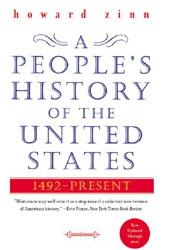People's History

While most historians study the role of great men in affecting history, Howard Zinn chronicles history from the bottom up, from the street, the home, and the workplace. His signature work, A People's History of the United States, is told from the viewpoint of—and in the words of—its women, factory workers, African-Americans, Native Americans, working poor, and immigrant laborers. In his contribution to a balanced understanding of history, Zinn describes how many of the country's greatest internal battles—for labor laws, women's rights and racial equality—were carried out at the grassroots level, against steel-willed resistance. It is "a history written from the standpoint of those who have been marginalized politically and economically and whose struggles have been largely omitted from most histories."
Here is a link to Howard Zinn's A People's History of the United States available online. A must-must-must read.
Hear a Dramatic reading of Zinn's A People's History of the United States from Democracy Now!
...the idea that history is made from the top, and if we want change to come about we must depend on our presidents, on the Supreme Court, on Congress. If history shows anything, to me, it shows that we cannot depend on those people on top to make the necessary changes towards justice and peace. It's social movements we must depend on to do that.Hear an interview of Howard Zinn by Bob McChesney, host of Media Matters.
...It's not possible because all history is a selection out of an infinite number of facts. As soon as you begin to select, you select according to what you think is important. Therefore it is already not objective. It's already biased in the direction of whatever you, as the selector of this information, think people should know. So it's really not possible. Of course, some people claim to be objective. The worst thing is to claim to be objective. Of course you can't be. Historians should say what their values are, what they care about, what their background is, and let you know what is important to them so that young people and everybody who reads history are warned in advance that they should never count on any one source, but should go to many sources. So it's not possible to be objective, and it's not desirable if it were possible. We should have history that does reflect points of view and values, in other words, history that is not objective. We should have history that enhances human values, humane values, values of brotherhood, sisterhood, peace, justice and equality. The closest I can get to it is the values enunciated in the Declaration of Independence. Equality, the right of all people to have life, liberty and the pursuit of happiness. Those are values that historians should actively promulgate in writing history. In doing that they needn't distort or omit important things. But it does mean if they have those values in mind, that they will emphasize those things in history which will bring up a new generation of people who read history books and who will care about treating other people equally, about doing away with war, about justice in every form.
I have my biases, my leanings. So if I'm writing or speaking about Columbus, I will try not to hide, omit the fact that Columbus did a remarkable thing in crossing the ocean and venturing out into uncharted waters. It took physical courage and navigational skill. It was a remarkable event. I have to say that so that I don't omit what people see as the positive side of Columbus. But then I have to go on to say the other things about Columbus which are much more important than his navigational skill, than the fact that he was a religious man. That is how he treated the human beings that he found in this hemisphere. The enslavement, the torture, the murder, the dehumanization of these people. That is the important thing.There's an interesting way in which you can frame a sentence which will show what you emphasize and which will have two very different results. Here's what I mean. Take Columbus as an example. You can frame it, and this was the way the Harvard historian Samuel Eliot Morison in effect framed it in his biography of Columbus: Columbus committed genocide, but he was a wonderful sailor. He did a remarkable and extraordinary thing in finding these islands in the Western Hemisphere. Where's the emphasis there? He committed genocide, but ... He's a good sailor. I say, He was a good sailor, but he treated people with the most horrible cruelty. Those are two different ways of saying the same facts. Depending on which side of the buck you're on, you show your bias. I believe that it's good for us to put our biases in the direction of a humane view of history.









